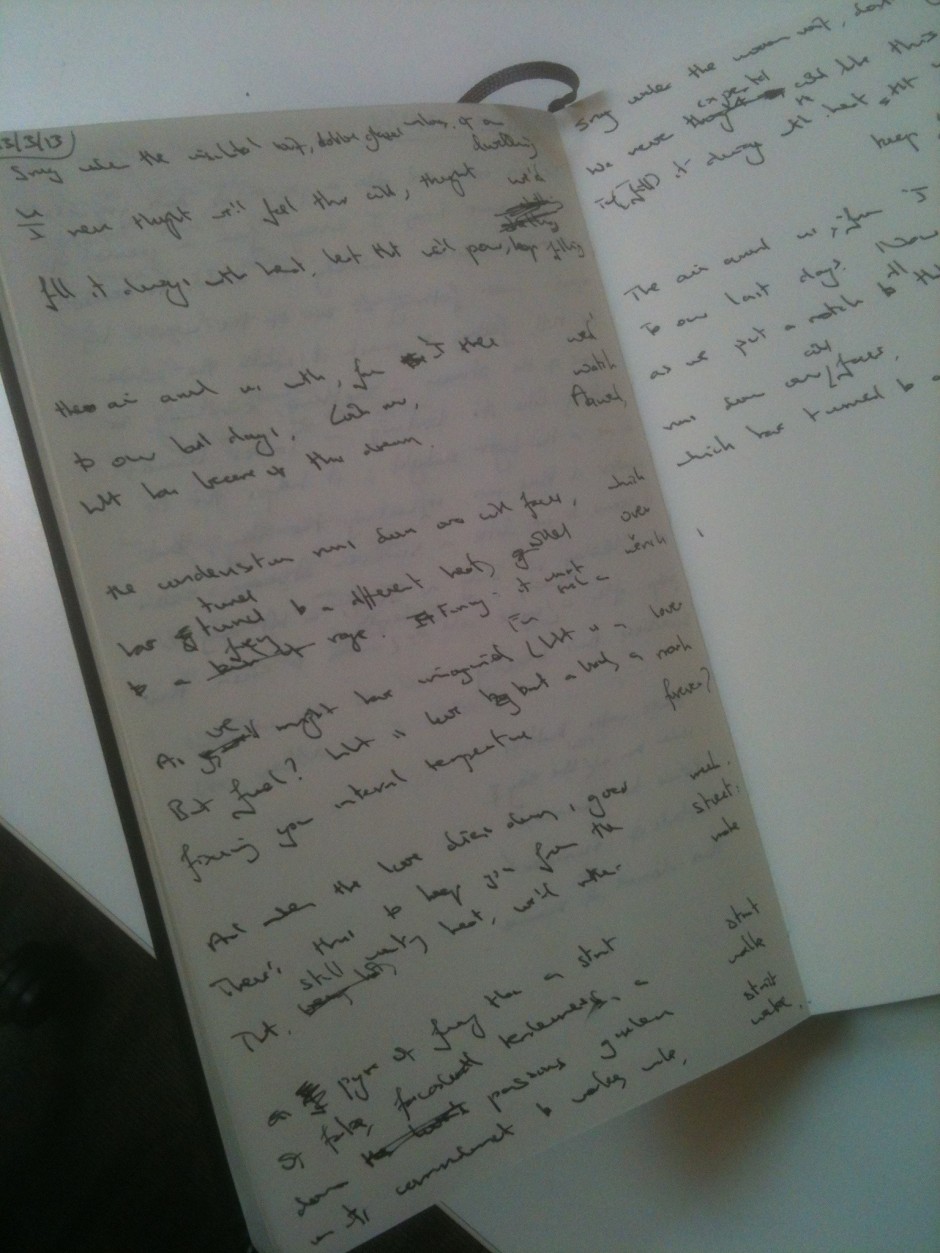I am a sporadic writer, of poetry at least. I do start every working day with writing, but it’s not usually a poem. I tend to write my poems in bursts, as I have always done since I was 16. I might write nothing for weeks or even months, and then create a flurry of new drafts all at once. Then back to nothing.
This method hasn’t served me too badly over the years, but for some time I have been trying to change it, because it’s not a good basis for a career as a professional writer. It makes is hard to produce enough work for regular, frequent submissions; or at least not enough good work. This is partly because the flurries don’t include enough time to redraft and polish the drafts, and completing a poem for me is a long, drawn-out process. But also, I know that it’s the quantity of work that’s necessary to find quality: one of the valuable things (among many) that I learnt from David Morley when I studied under him at Warwick University.
And besides, when I’m not writing, I’m not usually happy. When I am writing, I can’t guarantee that I will be happy, but the odds are definitely better.
So I’ve known for a while that it makes absolute, total sense to get into a daily writing habit. I’ve planned to do, vowed to do it, tried to do it, started doing it. And yet, more often than not, I’m not doing it.
Why not? I often ask myself that, occasionally with a couple of quite vehement words between ‘why’ and ‘not’. I enjoy writing when I do it, so what’s the problem? And there clearly is a problem – it’s not laziness because I’m not a lazy person, and it’s not that I don’t really want to be a writer, because it’s all I’ve ever wanted to be. So what the [vehement word] is going on?
If that was an easy question to answer, it wouldn’t need answering. And thousands, if not millions, of other would-be and actual writers would also not have to ask themselves, with depressing frequency, If I want to be a writer so much, why is that I am not actually writing?
And yet I think there is a clear answer. In her excellent book The Creative Habit, choreographer Twyla Tharp spends the first section discussing the fears that surround any new creative enterprise. She takes their existence as a given, even for someone like her, with decades of experience of successful creativity. These fears just seem to go with the act of creation, and they don’t go away no matter how long you’ve been doing it, or how well you may have done it before. Every time I begin a new poem, or even go back to work on an existing draft, I am afraid.
So I suspect that the difference between writers who do have a professional writing habit, and those who don’t, is how they deal with those fears. In my non-writing periods, the fears are in control; they stop me even before I get to the blank page. I don’t want to have to confront them. But when something gets me over that – perhaps reading a really good poem by someone else, perhaps a deadline that won’t let me not write – and I start to write, for a while the bliss of creativity beats them down, and I produce several things. So my problem becomes, how can I engineer circumstances that will have that effect every day?
That’s the hard part. Those fears are resourceful: they can worm their way around most things I try to put in their way. I’ve tried just starting anyway, fears or not; sometimes it works, more often it doesn’t. I’ve tried setting myself deadline, including public ones on Facebook; mostly it works, but sometimes it doesn’t. I’ve tried reading great poems before I start my own work, to remind me of the point of the whole enterprise; sometimes it works, sometimes it doesn’t. I’ve tried reading my own past work before starting, to reassure myself that I can actually do it; sometimes it works, sometimes it doesn’t. I’ve tried writing something trivial to being with, to lower the stakes; sometimes it works, sometimes it doesn’t.You get the picture.
Twyla Tharp has found her own unique morning routine – she calls it a ritual – that ‘impels’ her (her word) into creativity. Part of that is an explicit facing-down of her fears: she goes over what they are, then rationally examines how true or relevant they are – which of course they aren’t. Then she can move into her working day. Natalie Goldberg, in Writing Down The Bones (another excellent book) suggests something similar: writing down everything your fears are saying to you (she calls it your ‘inner critic’, but it’s the same thing), to distance yourself from them.
I’ve done a bit of the rational-assessment method, but never by writing it all down. Having re-read that part of Bones over the weekend, I thought it had to be worth a go. So yesterday, immediately after a disastrous attempt at drafting, I wrote down what my fears were telling me. It was a powerful experience: I was taken aback by the sheer viciousness of the abuse that I was throwing at myself. I don’t know why this should be the case, but it was quite upsetting. That was the end of trying to write for that day, but it did explain the paralysis that has so often frustrated me: why the hell would I want to expose myself to that kind of vitriol, by the foolish act of trying to write a poem? No-one would.
But today, all feels different. Seeing those fears and self-criticisms in writing seems to have allowed me to take them more lightly. I’d like to say that they’re all nonsense, but I can see that each fear has a kernel that’s relevant: for example, fearing that I know nothing about poetry is not true, but it is true that I always feel I could know more, and would like to know more. But they are unreasonable exaggerations – not something I should listen to, much less allow to dominate.
So today, after my other little bits of morning ritual, I started a new poem. I used David Morley’s slant-rhyme terza rima trick: write the rhyme words (chosen at random) first, put them on the page in the right places, then write quickly join them up with sentences. I like this because the randomness, which I enhance by choosing some rhyme words ‘blind’ from books, makes me feel that I’m not responsible for what comes out; that takes the pressure off, and has the added benefit of making the poem fresh and surprising for me, and therefore hopefully for a reader too. Sometimes this exercise works brilliantly, sometimes it bombs, but it’s always fun – you never know what the framework of rhymes and the time pressure will drag up.
In today’s poem for example I found myself writing about a couple divorcing. This being something I have no experience of, I would never have written about it without the mysterious stimulus of the pre-chosen form. It’s rough, of course, but has some lines I like: ‘what is a lover / but fuel’, for example. And best of all I ENJOYED IT, and now feel like playing some more. Next step is to work on some redrafting: I’ve got one poem that I’ve been chipping away at for 2 years, that I’d really like to see ‘finished’. It was shortlisted for the Bridport Prize last year, but I’m convinced it can be better. So that’s my project tomorrow.
Hoo – [vehement word] – rah. On a wave of joy and confidence, I shall now probably have a good few days, perhaps more, of writing. Thank goodness – it has been a while. But this time, can I keep it going?



Hi Brian. May I suggest another book you might like to hear about on writing freefall.
http://www.valapublishers.coop/writingwithoutaparachute
I’m a member of Vala Publishing cooperative and head up marketing. If you’d like to review this book just published by Vala, as a writer and teacher I can arrange to have a copy sent to you. Please email me your details and confirm you’d be happy to do this. Enjoyed reading your blog. I’m also an alumni member of the University of Winchester.